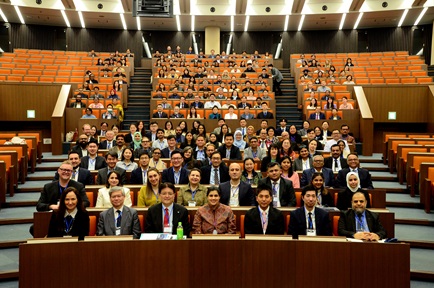Leadership and the Future of Banking
NBS Knowledge Lab Dean's Distinguished Speaker Series with Mr Piyush Gupta, CEO and Director of DBS Group
In the 2022 edition of the NBS Knowledge Lab Dean's Distinguished Speaker Series held on 25 August, Mr Piyush Gupta, CEO and Director of DBS Group, discussed his leadership experiences, particularly in the rapidly changing business environments and his vision for the future of banking.
Moderated by Professor Christina Soh, Dean of Nanyang Business School, the hybrid event, held at Nanyang Auditorium and online via Zoom, attracted the interest of over 1,000 people across 27 countries.
Understanding leadership fundamentals
Beginning with a personal sharing of his development as a leader, Mr Gupta said that leadership is an acquired skill.
Skills can be picked up along the way, but it is important for leaders to have a worldview and to seek external stimulus as a leader since no one can develop perspectives in a vacuum.
In particular, Mr Gupta shared the four fundamentals of effective leadership:
(1) Develop a strategy and vision – having a point of view and laying a course of action for it;
(2) Ensure alignment – inspiring people to work together under a common vision;
(3) Manage business systems – ensuring the organisation can achieve its vision; and
(4) Learn to understand and shape culture – developing the company’s culture based on its ethos.
Changing organisational culture
With regards to undertaking the right moves to impact positive cultural change over the past 10 years, Mr Gupta admitted that he could not have foreseen the success back then.
But he knew then that the bank needed to fix its customer experience as getting the customer equation right would simultaneously change the mindset.
Introducing the notion of “culture by design”, Mr Gupta shared how DBS created nudges (such as an award system) to encourage employees towards more entrepreneurial behaviours.
For example, when employees take risks to try new ways of getting things done but end up making mistakes, they should not be rebuked or punished.
Although there will always be concerns with employees who are unwilling or unable to change, Mr Gupta did not believe that older people cannot adapt to changes.
Referring to how smartphones have changed people’s personal lives, he said that if people are willing to make changes in their personal lives, they are also capable of making changes in their professional lives.
The only reason employees cannot make changes in their professional lives is because they lack support from their respective organisations.
They either get no help or are conscious of the repercussions of taking risks and making mistakes. To address this, DBS consciously creates conditions for learning, such as setting up hackathons so that employees can learn from youths in start-up projects.
Naturally, cultural changes also come with structural modifications and DBS deals with manpower issues through reskilling. In 2016, the bank worked with the union to discuss how to reskill the 1,600 employees that they had to dislocate. About 400 quit the company, but more than 1,000 of
the 1,200 remaining switched to new roles and jobs in the system.
The “change journey” can be exhausting for those who remain with the organisation. However, to keep employees’ energy levels up, he concentrates on small things, such as organising
regular parties and building the idea of fun into the bank’s value system. He
added that people get energised when they think they are winning.
Becoming a leader of the future
Even as rapid changes take place in the business environment, Mr Gupta said that the fundamentals of leadership are immutable. The expression of leadership style, though, must evolve.
For the longest time, firms have been working with a hierarchical structure, but with today’s technology and freely available information, there is no longer a need to lead this way. Instead, firms can be managed horizontally.
In addition, leadership in the future cannot be about making predictions. Instead, it should be about adaptability, being able to respond to constantly changing stimuli, and having the appetite for failure. Leaders would also have to acquire a wide range of knowledge and have the capacity to connect the dots.
The Five 'I's
Mr Gupta shared his Five 'I's for leadership success: individual accountability, initiative, innovation,
inspiration, and intent or purpose. He said this management mantra would also benefit students and recent graduates taking the first steps in their careers.
He added that communication skills will be important in the future and that individuals should also have clarity about what they want to achieve in life and how that aligns with the company’s vision.
Mr Gupta reiterated the need for people to take risks because staying in one’s comfort zone would mean becoming set in their ways.
Of course, risks do not always work out, and this was the case for him when he took a hiatus from his banking career in 2000. He had then decided on a start-up IT business that eventually failed.
Despite the setback, Mr Gupta felt that the experience helped change his capacity to take risks because he then took another chance to return to Singapore to lead DBS. “Individuals should have more confidence in themselves and focus less on personal achievement outcomes,” he said.
Technology and sustainability
Addressing the issue of digitalisation and sustainability, Mr Gupta said that technology would play a major role in reimagining all systems in a low carbon-intensive world.
For example, digitalisation helps measure and validate carbon footprint, provides transparency, and facilitates carbon credit exchanges.
Mr Gupta said he is optimistic about relationship between
technology and banking. While traditional banking has been built around the hub and spoke model due to the need for a central record keeper, the hub is no longer needed with a distributed ledger.
We can now keep track of everything digitally, creating possibilities for everyone to operate with one another. For example, stakeholders in trade and finance will no longer need to track ownership transfers through paper movement and blockchain, allowing all to have a common line of sight.
While technology may seem like a threat to incumbent banks, Mr Gupta is confident that the winners will be the ones who get the customer experience right.
The future may see a mix of different banking services. Still technology will be the common tool, and the difference will be about adaptability and the capacity to know how to manage differently.







